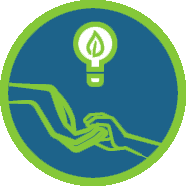The EU-funded EERAdata project will develop, explore, and test a FAIR and open data ecosystem in the field of low-carbon energy research
Brussels – Data-driven energy research produces large amounts of data. However, the majority of databases don’t allow for re-analysis and lack integration of interdisciplinary and complex data. Tapping the enormous potential of energy data is crucial for informed decision-making, guiding the successful transition to a clean energy system and accelerating the market uptake of research results. Today, a consortium led by the Western Norway University of Applied Sciences (HVL) is kicking off the EERAdata project. Together, the project partners from Norway, Turkey, Austria, Italy, Belgium, and Poland strive to advance efforts on opening databases and making low-carbon energy data findable, accessible, interoperable, and re-usable – in short: FAIR.
Most energy databases are unfit for the use of advanced analytical tools, causing forgone opportunities that arise from advanced ICT solutions. This adds to the problem that the transition towards low-carbon energy systems requires the integration of interdisciplinary and complex data. “We are observing an ever-growing graveyard of energy databases and data platforms,” says EERAdata coordinator Valeria Jana Schwanitz, Professor at HVL. “On the other hand, the availability of new data collection and analysis techniques is boosting data-driven research in the energy field. It allows us for instance to advance our understanding of how social phenomena shape the energy system.”
However, the growing degree of complexity and uncertainty through the integration of different types of data streams and numerous interlinkages requires new data concepts and infrastructures. They are a prerequisite for enabling the documentation and reproducibility of scientific results. Transparent management of data provides the basis for industry to develop new solutions and for society to choose, monitor, and implement sustainable transition pathways. For example, metadata mappings allow to compare technologies, depict their comparative advantages and disadvantages systematically.
Developing, exploring, and testing a FAIR and open data ecosystem
The goal of the EERAdata project is to develop, explore, and test a FAIR and open data ecosystem for low-carbon energy research data, where FAIR stands for F-indable, A-ccessible, I-nteroperable, R-e-usable. More specifically, this will be achieved through:
- Promoting the opening and FAIRification of a subset out of 50 databases
EERAdata will engage in an intensive dialogue with stakeholders of databases to open their data and foster a mental shift in the low-carbon energy research community. The consortium has designed four use cases, for which they will jointly discuss and suggest FAIR and open data standards:
- Buildings efficiency
- Power transmission & distribution networks
- Material solutions for low-carbon energy
- Low-carbon energy and energy efficiency policies - Developing a community platform as an entry point for both data providers and users
The platform will build on and link to existing platforms, providing a unified and seamless access to relevant energy data repositories. The platform will not duplicate resources but will establish a technical interface to access a variety of resources stored by database providers and using standard web formats. EERAdata aspires to develop the platform into a reference point for community-agreed standards and projects of common interest for opening and FAIRifying low-carbon energy research data. - Building technical, operational, and financial capacities for managing FAIR and open data
EERAdata will engage the broad low-carbon energy research community through a systematic workshop concept. The workshops will address domain experts as well as experts for FAIR and open data, who will jointly develop and test the ecosystem and the community platform. Ultimate goals are to create a pool of experts and FAIR data stewards and provide information and training elements tailored to the needs of the low-carbon energy research community. - Coordinating the management of data in the energy field within EERA and beyond
EERAdata targets to build a critical mass to explore the prospects of FAIR and open data in the energy domain and provide recommendations to the scientific community and policymakers. The project links to twelve national initiatives, the European Open Science Cloud, and further international initiatives. The project also involves the European Energy Research Alliance (EERA).
Contact
Valeria Jana Schwanitz
Professor at Department of Environmental Sciences
Western Norway University of Applied Sciences
Phone: +47 57 67 61 25
E-mail: Valeria.Jana.Schwanitz@hvl.no
About EERAdata
The EERAdata project develops, explores, and tests a FAIR (findable, accessible, interoperable, re-usable) and open data ecosystem in the low-carbon energy field. The new data infrastructure will be established through broad community involvement and applied in four use cases. EERAdata also implements an open platform for seamless access to energy data and establishes a pool of experts and data stewards to facilitate a mental shift towards FAIR and open data practices. EERAdata is linked to the European Open Science Cloud and various national open science initiatives. It is run by Western Norway University of Applied Sciences (HVL), İzmir University of Economics (IUE), Austrian Institute of Technology (AIT), Italian National Agency for New Technologies, Energy and Sustainable Economic Development (ENEA), Central Mining Institute (GIG), and European Energy Research Alliance (EERA). The European Commission funds EERAdata with €1m from 03/2020 to 02/2023.
 This project has received funding from the European Union’s Horizon 2020 research and innovation programme under grant agreement no. 883823.
This project has received funding from the European Union’s Horizon 2020 research and innovation programme under grant agreement no. 883823.
About the European Energy Research Alliance
The European Energy Research Alliance (EERA) is an association of European public research centres and universities active in low-carbon energy research. EERA pursues the mission of catalysing European energy research for a climate-neutral society by 2050. Bringing together more than 250 organisations from 30 countries, EERA is Europe’s largest energy research community. EERA coordinates its research activities through 17 Joint Programmes. The EERAdata project is an initiative of the Joint Programme e3s “Economic, Environmental and Social Impacts of the Energy Transition”. For further information, see www.eera-set.eu and www.eera-e3s.eu.
(Copy requested in case of publication: EERA, Rue de Namur 72, 1000 Brussels, Belgium)
